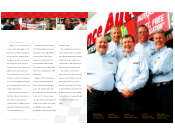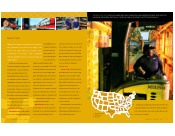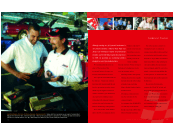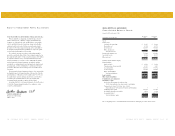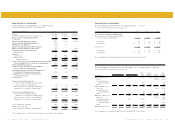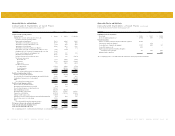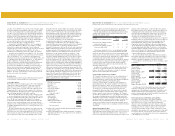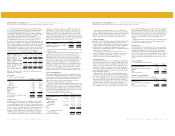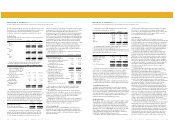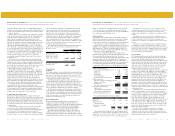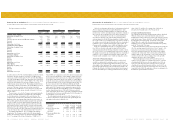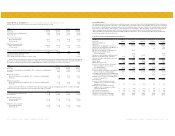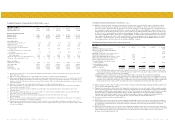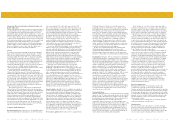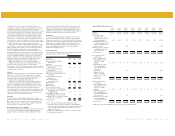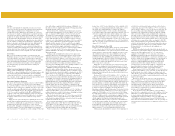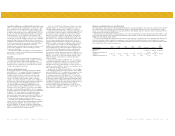Advance Auto Parts 2001 Annual Report Download - page 18
Download and view the complete annual report
Please find page 18 of the 2001 Advance Auto Parts annual report below. You can navigate through the pages in the report by either clicking on the pages listed below, or by using the keyword search tool below to find specific information within the annual report.
30 ADVANCE AUTO PARTS ANNUAL REPORT 2001 ADVANCE AUTO PARTS ANNUAL REPORT 2001 31
the entire principal amount due in five years. As of December 29, 2001 and
December 30, 2000, outstanding stockholder subscription receivables were
$2,676 and $2,364, respectively, and are included as a reduction to
stockholders’ equity in the accompanying consolidated balance sheets.
15. Income Taxes:
Provision (benefit) for income taxes for fiscal 2001, fiscal 2000 and fiscal
1999 consists of the following:
Current Deferred Total
2001-
Federal $ 13,822 $ (964) $ 12,858
State 513 (2,059) (1,546)
$ 14,335 $ (3,023) $ 11,312
2000-
Federal $ 8,005 $ 976 $ 8,981
State 1,847 (293) 1,554
$ 9,852 $ 683 $ 10,535
1999-
Federal $ (1,913) $ (6,535) $ (8,448)
State 1,979 (6,115) (4,136)
$ 66 $ (12,650) $ (12,584)
The provision (benefit) for income taxes differed from the amount
computed by applying the federal statutory income tax rate due to:
2001 2000 1999
Income (loss) before extraordinary
items and cumulative effect of a
change in accounting principle
at the statutory U.S. federal
income tax rate $ 9,976 $ 9,507 $(13,269)
State income taxes, net of federal
income tax benefit (1,005) 896 (2,688)
Non-deductible interest &
other expenses 1,067 1,010 1,125
Valuation allowance 44 914 596
Puerto Rico dividend
withholding tax - - 150
Other, net 1,230 (1,792) 1,502
$ 11,312 $ 10,535 $(12,584)
Deferred income taxes are recognized for the tax consequences in future
years of differences between the tax bases of assets and liabilities and their
financial reporting amounts at each period-end, based on enacted tax laws and
statutory income tax rates applicable to the periods in which the differences
are expected to affect taxable income. Deferred income taxes reflect the net
income tax effect of temporary differences between the bases of assets and
liabilities for financial reporting purposes and for income tax reporting
purposes. Net deferred income tax balances are comprised of the following:
December 29, December 30,
2001 2000
Deferred income tax assets $ 70,116 $ 57,378
Deferred income tax liabilities (38,020) (62,121)
Net deferred income tax (liabilities) assets $ 32,096 $ (4,743)
The Company incurred financial reporting and tax losses in 1999
primarily due to integration and interest costs incurred as a result of the
fiscal 1998 Western Merger and the Recapitalization. At December 29,
2001, the Company has cumulative net deferred income tax assets of
$32,096. The gross deferred income tax assets include deferred tax assets
of approximately $33,000 related to the excess tax basis over book value of
the net assets obtained through the Discount acquisition. The gross
deferred income tax assets also include federal and state net operating loss
carryforwards (“NOLs”) of approximately $6,596. These NOLs may be
used to reduce future taxable income and expire periodically through fiscal
year 2020. The Company believes it will realize these tax benefits through
a combination of the reversal of temporary differences, projected future
taxable income during the NOL carryforward periods and available tax
planning strategies. Due to uncertainties related to the realization of certain
deferred tax assets for NOLs in various jurisdictions, the Company
recorded a valuation allowance of $1,554 as of December 29, 2001 and
$1,510 as of December 30, 2000. The amount of deferred income tax
assets realizable, however, could change in the near future if estimates of
future taxable income are changed.
Temporary differences which give rise to significant deferred income
tax assets (liabilities) are as follows:
December 29, December 30,
2001 2000
Current deferred income taxes-
Inventory valuation differences $ (18,783) $ (36,051)
Accrued medical and workers compensation 7,233 2,319
Accrued expenses not currently
deductible for tax 26,753 16,391
Net operating loss carryforwards 3,916 7,124
Minimum tax credit
carryforward (no expiration) 5,599 0
Total current deferred income taxes $ 24,718 $ (10,217)
Long-term deferred income taxes-
Property and equipment $ (19,237) $ (24,571)
Postretirement benefit obligation 8,013 8,254
Amortization of bond discount 12,076 8,184
Net operating loss carryforwards 2,680 9,807
Minimum tax credit carryforward (no expiration) 0 6,809
Valuation allowance (1,554) (1,510)
Other, net 5,400 (1,499)
Total long-term deferred income taxes $ 7,378 $ 5,474
These amounts are recorded in other current assets, other current
liabilities and other assets in the accompanying consolidated balance
sheets, as appropriate.
The Company currently has four years that are open to audit by the
Internal Revenue Service. In addition, various state and foreign income tax
returns for several years are open to audit. In management’s opinion, any
amounts assessed will not have a material effect on the Company’s
financial position or results of operations.
Additionally, the Company has certain periods open to examination by
taxing authorities in various states for sales and use tax. In management’s
opinion, any amounts assessed will not have a material effect on the
Company’s financial position or results of operations.
16. Lease Commitments:
The Company leases store locations, distribution centers, office space,
equipment and vehicles under lease arrangements that extend through
2010, some of which are with related parties. Certain terms of the related-
party leases are more favorable to the landlord than those contained in
leases with non-affiliates.
Advance Auto Parts, Inc. and Subsidiaries Notes to Consolidated Financial Statements (continued)
December 29, 2001, December 30, 2000 and January 1, 2000 (in thousands, except per share data and per store data)
At December 29, 2001, future minimum lease payments due under
non-cancelable operating leases are as follows:
Related
Other (a) Parties (b) Total
2002 $ 133,704 $ 3,677 $ 137,381
2003 123,114 3,447 126,561
2004 109,275 2,537 111,812
2005 92,276 2,240 94,516
2006 75,608 1,764 77,372
Thereafter 337,858 447 338,305
$ 871,835 $ 14,112 $ 885,947
(a) The Other and Related Parties columns include stores closed as a
result of the Company’s restructuring plans (See Note 4).
At December 29, 2001, future minimum sub-lease income to be received
under non-cancelable operating leases is $8,935. Net rent expense for fiscal
2001, fiscal 2000 and fiscal 1999 was as follows:
2001 2000 1999
Minimum facility rentals $ 122,512 $ 112,768 $ 103,807
Contingent facility rentals 811 1,391 2,086
Equipment rentals 2,341 1,875 3,831
Vehicle rentals 6,339 6,709 4,281
132,003 122,743 114,005
Less: Sub-lease income (2,558) (1,747) (1,085)
$ 129,445 $ 120,996 $ 112,920
Contingent facility rentals are determined on the basis of a percentage
of sales in excess of stipulated minimums for certain store facilities.
Most of the leases provide that the Company pay taxes, maintenance,
insurance and certain other expenses applicable to the leased premises
and include options to renew. Certain leases contain rent escalation
clauses, which are recorded on a straight-line basis. Management expects
that, in the normal course of business, leases that expire will be renewed
or replaced by other leases.
Rental payments to related parties of approximately $3,824 in fiscal 2001,
$3,921 in fiscal 2000 and $3,998 in fiscal 1999 are included in net rent expense.
17. Installment Sales Program:
A subsidiary of the Company maintains an in-house finance program,
which offers financing to retail customers (Note 5). Finance charges of
$3,343, $3,063 and $2,662 on the installment sales program are included in
net sales in the accompanying consolidated statements of operations for the
years ended December 29, 2001, December 30, 2000 and January 1, 2000,
respectively. The cost of administering the installment sales program is
included in selling, general and administrative expenses.
18. Subsequent Event:
On November 2, 1998, the Company acquired Western from WAH, a wholly-
owned subsidiary of Sears, Roebuck and Co. (“Sears”), through the issuance
of 11,475 shares of common stock. On February 6, 2002, the Company
engaged in a transaction with Sears in which the Company transferred to
Sears 11,475 shares of the Company’s common stock, in exchange for all the
outstanding common stock of WAH. WAH’s only asset was the 11,475 shares
of the Company’s common stock received on November 2, 1998. The
Company immediately retired the shares of the Company’s common stock
held by WAH and liquidated WAH on February 6, 2002.
On March 6, 2002, the Company’s registration statement on Form S-1
with the Securities and Exchange Commission to register 2,250 primary
shares and 6,750 secondary shares for offering on the public market
became effective. The Company intends to use the net proceeds it receives
to repay outstanding indebtedness. The Company will not receive any
proceeds from the sale of the secondary shares.
19. Contingencies:
In the case of all known contingencies, the Company accrues for an
obligation, including estimated legal costs,when it is probable and the amount
is reasonably estimable. As facts concerning contingencies become known to
the Company, the Company reassesses its position both with respect to gain
contingencies and accrued liabilities and other potential exposures. Estimates
that are particularly sensitive to future change include tax and legal matters,
which are subject to change as events evolve and as additional information
becomes available during the administrative and litigation process.
In March 2000, the Company was notified it has been named in a
lawsuit filed on behalf of independent retailers and jobbers against the
Company and others for various claims under the Robinson-Patman Act.
On October 18, 2001, the court denied, on all but one count, a motion by
the Company and other defendants to dismiss this lawsuit. It is expected
that the discovery phase of the litigation will now commence (including
with respect to the Company); however, determinations as to the discovery
schedule and scope remain to be determined. The Company continues to
believe that the claims are without merit and intends to defend them
vigorously; however, the ultimate outcome of this matter cannot be
ascertained at this time.
In January 1999, the Company was notified by the United States
Environmental Protection Agency (“EPA”) that Western Auto and other
parties may have potential liability under the Comprehensive
Environmental Response Compensation and Liability Act relating to two
battery salvage and recycling sites that were in operation in the 1970s and
1980s. The EPA has indicated the total cleanup for this site will be
approximately $1,600. This matter has since been settled for an amount not
material to the Company’s financial position or results of operations.
Sears has agreed to indemnify the Company for certain other litigation
and environmental matters of Western that existed as of the Western
Merger date. The Company recorded a receivable from Sears of
approximately $2,685 relating to certain environmental matters that had
been accrued by Western as of the Western Merger date. During the first
quarter of 2001, the Company received notification from Sears that certain
of these matters have been settled. Accordingly, the Company reversed
$2,500 of the previously recorded $2,685 receivable due from Sears and
reduced the corresponding environmental liability. Additionally, as of the
Western Merger date, Sears has agreed to indemnify partially the Company
for up to 5 years for certain additional environmental matters that may arise
relating to the period prior to the Western Merger. The Company’s
maximum exposure during the indemnification period for certain matters
covered in the Western Merger agreement is $3,750.
In November 1997 a plaintiff, on behalf of himself and others similarly
situated, filed a class action complaint and motion of class certification
against the Company in the circuit court for Jefferson County, Tennessee,
alleging misconduct in the sale of automobile batteries. The complaint
seeks compensatory and punitive damages. In September 2001, the court
granted the Company’s motion for summary judgement and dismissed all
claims against the Company in this matter. The period for appeal has not
expired. The Company believes it has no liability for such claims and
intends to defend them vigorously. In addition, three lawsuits were filed
Advance Auto Parts, Inc. and Subsidiaries Notes to Consolidated Financial Statements (continued)
December 29, 2001, December 30, 2000 and January 1, 2000 (in thousands, except per share data and per store data)


